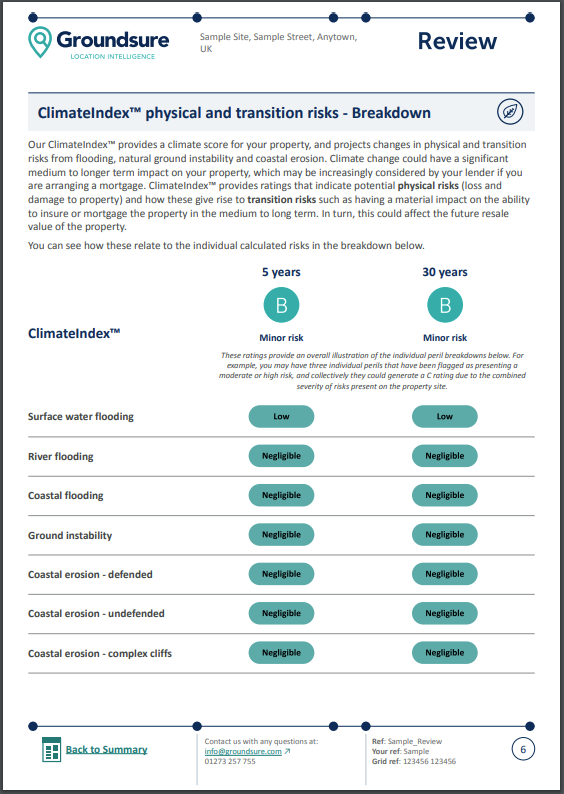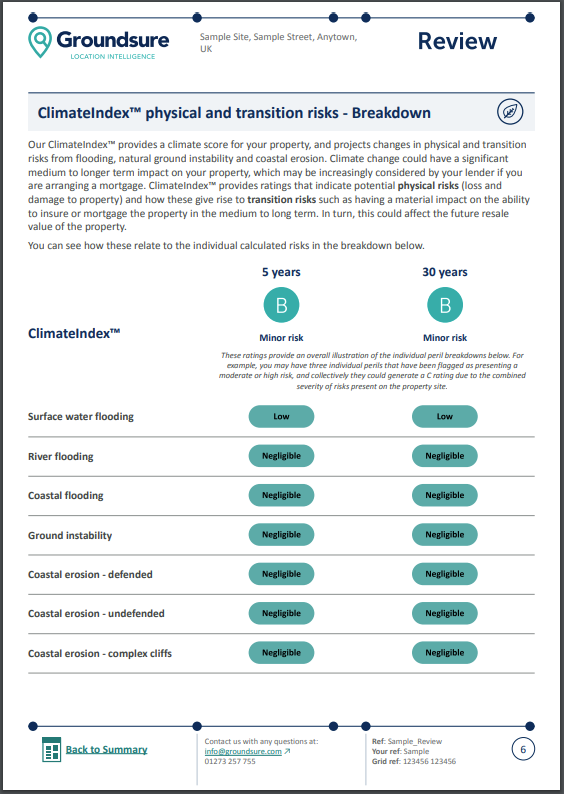Interpreting Climate Search Results for Property Transactions

Introduction
The term ‘climate search’ has entered the legal lexicon over the past year. Referenced in the Law Society’s groundbreaking Climate Change Guidance for Solicitors (April 2023), solicitors should not necessarily think that these are additional searches – Groundsure, for example, includes climate analysis within their standard environmental searches at no additional cost or complexity in terms of search pack combinations
Adverse climate search results
It is important to stress right away that the vast majority of land and property will show a limited short and long term impact by climate change and we need to think about the exceptions here.
An adverse climate search result might, for instance, indicate that the property you are transacting could be impacted by coastal erosion within the next 30 years. According to Groundsure’s ClimateIndex™ analysis, the number of seaside properties that are at risk from coastal erosion is projected to quadruple by 2050 so this is not a hypothetical risk for conveyancers and our clients. The risk here is quite stark – a complete loss of property, a complete loss of value and potential loss of life.
Other adverse results might include increased exposure to flooding as we experience wetter winter weather and an increased risk of ground instability due to hotter summers such as we endured in 2022. These could both impact insurability and value, so these are also significant issues for our clients.
Duties to Warn and Disclose
It is worth having a brief recap on what the Law Society’s Climate Change Guidance for Solicitors has to say about our duties and responsibilities. Two legal duties are particularly relevant here:
- Solicitors have a common law duty to warn clients about the impact of climate change on their legal interests, including their property, and the companies. The duty is particularly acute if a City law firm with in-house environmental expertise is advising an inexperienced client, but it applies to all lawyers and all transactions.
- Solicitors also have a duty to disclose all information material to the matter they are advising upon under Rule 6.4 of the SRA Code of Conduct for Solicitors. Hence, a solicitor who becomes aware of climate legal risks that might impact the client’s interests should disclose them to the client and this includes the disclosure of climate search results. To discharge the disclosure duty, it is not sufficient to simply forward the climate search result to the client with no commentary or explanation. The lawyer needs to explain what the search says in a clear and understandable way.
The combination of these legal duties requires us to take climate risk more seriously and to advise our clients accordingly.
This may necessitate a degree of upskilling for us to better understand the impact of climate change on land, buildings, people and businesses, but this is not a particularly burdensome task. Indeed, there are webinars and on-line accreditation courses available now which can be undertaken, perhaps in conjunction with your COLP to add to your training record as proof of competence.
Lawyers are often called upon to advise our clients on very complex and difficult issues on a day-to-day basis. Explaining climate search results to a prospective homeowner or commercial property client is neither complex nor difficult in the wider context of our work.
Approach to Informing Clients about Adverse Climate Risk Finding
It is important to understand the range of risks that the climate search is assessing.
An adverse climate search result can occur for different reasons so our advice to our client will vary depending upon the underlying issue that is being identified in the search.
The issue of concern may be, for instance, a projected increase in the risk of the property being damaged or destroyed by coastal erosion.
Climate Risk Rating
We use a risk rating system from A to F for the physical risks (such as coastal erosion) and transitional climate risks that are analysed in their searches:
- Properties rated A are not exposed to climate risk;
- Properties rated B are exposed to minor climate risk;
- Properties rated C are exposed to minor to moderate risk;
- Properties rated D are exposed to moderate risk;
- Properties rated E are exposed to significant risk; and
- Properties rated F are exposed to severe climate risk.
Solicitors need to be especially alert to properties which are exposed to moderate, significant or severe climate risk – so, Ds, Es and Fs.
Climate searches typically model the likely physical impacts of a changing climate on land and buildings up to the year 2050.
So, an adverse climate search is one that shows a property being exposed to increased climate risk between now and 2050 – e.g., a property which moves from a C rating at the present time to a D, E or F rating, as illustrated below:

This would need to be flagged to the client to explain to them that a) the property is exposed to significant climate risk over the long term; and 2) why the property is at climate risk not least because the impacts on value and the cost of remedial measures will vary depending upon the nature and extent of the risk.
Relevant Law
Assuming that the above projection of a property facing a climate risk ranking of E by 2050 is due to coastal erosion, if I was advising a client looking to buy this property I would first of all ascertain whether the property is being protected from coastal erosion as a result of coastal defences.
This information will be included in the ClimateIndex™ analysis automatically provided in the Homebuyers and Avista residential searches, and both of Groundsure’s Commercial Searches.
If there are coastal defences in place (e.g., a sea wall) I would then explain to the client that the public authority responsible for maintaining the defences will not be under a legal duty to do so over the long term under the relevant legislation.
They will have a discretion to maintain the defences under the relevant legislation, but their ability to carry out such works will depend in large part on whether they have the financial resources to pay for it. This will depend on local and central government budgets so it is not a complete foregone conclusion that the defences will be maintained.
Valuer
I would recommend that practitioners consider instructing a valuer to estimate the impact on the value of the property from coastal erosion in either a defended scenario (where the defences continue to be maintained) or an undefended scenario (where defence work is discontinued).
Insurance
I would also recommend that clients should consider speaking to their insurance broker to ascertain whether the above projection of an E rating by 2050 due to increased coastal erosion risk is likely to have an impact on the insurability of the property over time.
Given that most policies provide annual cover, this may not be such an issue in the short to medium term – however, the advice should come from a regulated insurance professional. In the worst instance, a property that is uninsurable for physical perils such as flood, subsidence and coastal erosion is not going to be mortgageable and its value will be significantly impacted as a result.
Reporting
To report the above information to the client, you should use climate reporting clauses such as those which have been developed by The Chancery Lane Project (Marni’s Clause), although some law firms are either tailoring these or developing their own reporting clauses to meet the requirements of their clients.
We have developed a set of clauses based on the above rating outcomes that are in line with Marni’s Clause and can be accessed here.
It is straightforward to then translate this wording into your standard templates to ensure a consistent and contained approach every time. Remember – you are not climate scientists, you are property lawyers or conveyancers, so it is important to stay within these confines.
Informed decision
The client should then be asked to take all of the above information into consideration.
Armed with the recommendations of the valuer and the insurance broker – and advice on the relevant law relating to coastal defences – the client is then better placed to make an informed decision about the transaction.
Compliance
From a compliance perspective, having taken the above measures, you can be confident that you have discharged your professional duties to warn your client and disclose material climate risk analysis information to them.
Non-Compliance
What then might be the repercussions for a solicitor who fails to alert their client about climate search results?
As the UK’s leading environmental law practitioner, Stephen Tromans KC, commented over a year ago:
‘’A large part of a solicitor’s activities is directed towards protecting the client against possible future risks arising from the transaction. This is particularly true in the realm of conveyancing. If a solicitor fails to protect the client by making appropriate enquiries and searches then he will be negligent. The solicitor may rely on having passed the results of enquiries and searches to the client, but only provided that they take care to explain the gist of any relevant information they have acquired from those enquiries and searches to the client’’. (In the matter of Conveyancers’ Duty of Care to Advise Clients about Climate Risk and How to Discharge Such Duty, July 2022).
Download Stephen Tromans KC full legal opinion here.
Main points
Legal commentators have been analysing the underlying law relating to solicitor’s duties for the past 12-18 months. The Law Society’s guidance has been in place for several months.
If solicitors are still not discharging their legal duties to warn clients about climate risk and to disclose material information such as climate search results to their clients, they are clearly taking a professional risk.
The better alternative is to take climate risk seriously and, at the very least, to become familiar with what climate search services are available and then to advise the client on the need for them.
Lastly, we should be careful to relay the findings of the climate search to the client – to explain the gist of any relevant information we have acquired to our client.
Date:
Sep 14, 2023
Author:
David Kempster

